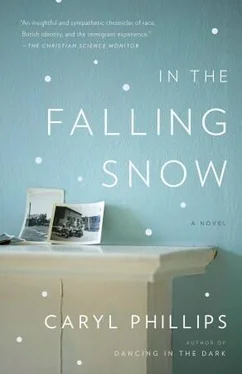Two days before the end of his first year at university, he waited for Annabelle outside Lecture Theatre One in the English department, and showed her the letter which effectively undid his summer plans. Despite Brenda’s urgings, he had consistently made it clear to her that he had no interest in spending the summer building any kind of a relationship with his father, for he felt that the effort should be coming in the other direction. In fact, he had already made plans to spend the late summer travelling around Europe on the trains. The university authorities had agreed that he could stay in the halls throughout the early summer, and so he had set himself up with a part-time job pumping petrol in a garage on the edge of the campus. He reckoned that by mid-August he would have saved enough money to fund a month of Inter-Railing, and perhaps have enough left over to be able to spend maybe another two weeks in Spain, or Portugal, or anywhere that was warm and cheap. After he and Annabelle had shared their first hot and stuffy night squeezed up tight in his single bed, he asked her if she wanted to join him ‘on the road’. She laughed and wondered if he was deliberately trying to sound like a hippie, but before he could answer she said ‘yes,’ she would love to join him but she would have to meet him in late August as her father had fixed up a job for her as a lowly dogsbody at the Wiltshire Times so she could acquire some journalism experience. However, just as he was beginning to feel happy and safe with their arrangements, everything came apart when he got the letter from Brenda. He walked over to the English department, and once Annabelle had read the letter he explained to her that this woman had pretty much raised him by herself and that if she needed his help then he had to be there for her as she didn’t really have anybody else in her life. Annabelle nodded and smiled. He assumed that she might be annoyed because he was changing their summer plans, but she slipped her arm through his and laughed. ‘Listen,’ she said, ‘we can do it next year. Europe will still be there. If she’s become ill then you must go and be with her. Maybe you could take me too, or maybe I can come and visit when it’s convenient?’
Two years later, as they stood on the threshold of graduation, they were an inseparable couple. They both realised that it wasn’t going to be possible to go forward with their lives until the situation with Annabelle’s parents had been confronted. It was Annabelle’s mother who telephoned her hall of residence and suggested that they would like to come up and take her for a pre-graduation dinner, and when Annabelle made it clear that she would not be alone she heard her mother’s flustered voice agree wholeheartedly that she must, of course, bring her ‘friend’. She left the choice of restaurant up to Annabelle, and then began to babble unceasingly, leaping from one topic to another, as though terrified to submit to a lull in conversation. The young couple decided upon the Madras Bicycle Club which was Indian colonial in décor, but the cuisine was far more eclectic. As he sat on the bed in Annabelle’s room, and watched as she put on her lipstick in the mirror, he had a sense of foreboding about the forthcoming meal with her parents for he knew that his girlfriend had been struggling with a kind of double life for the past two years. ‘Well,’ said Annabelle, dropping the cylinder of lipstick back into her handbag and then turning to face him. ‘I’m ready if you are.’ They had been in the restaurant once before, when Annabelle’s Wordsworth and Shelley tutor had missed two tutorials because of a three-week fellowship in California and wanted to make it up in some way. While that meal had passed off pleasantly enough, and Dr Stewart had treated them more like colleagues than students, the evening with Annabelle’s parents began ominously with Mr Johnson, having limply shaken hands with him, being visibly reluctant to make eye contact with anybody at the table. However, by the time he had downed his third Scotch and water, and the servers had cleared the main course plates from the table, he had introduced finger-wagging into his conversational style and decided to redirect his hostility away from his daughter and towards her boyfriend. Her father practically demanded of him that he take responsibility for his people’s ‘ill manners’. ‘You’re rather like the Irish aren’t you, with loud voices that get on one’s nerves and always protesting about what exactly? Mind you, at least you people are not bombing innocent civilians. Well, not yet.’ When he tried to explain to Mr Johnson the frustrations of his generation, the man laughed in his face and signalled to the waitress to bring another drink. A mortified Annabelle attempted to intervene and support her boyfriend’s argument, but when she was shouted down she simply removed her mother’s hand from her arm and left the table. Having neatly folded his napkin, he asked to be excused and climbed to his feet. He found a distraught Annabelle outside, standing bareheaded in the rain on the pavement in front of the restaurant. ‘I can’t believe my bloody mother. She actually leaned over and whispered to me, “He seems like a nice boy.” I mean, in the face of his ranting and raving, that’s the best she could come up with? Whispering to me.’ He held Annabelle’s hand for a few moments, and then he dried her tears with the back of his hand and realised for the first time that Annabelle was more than just a girlfriend. Standing in the rain outside the Madras Bicycle Club it occurred to him that he was probably going to know this young woman for the rest of his life. He looked at her, then slipped an arm around her shoulders and tried to persuade her that she should return to the table.
Although the rest of the meal was a predictable failure of communication, he now clearly understood why local authorities up and down the country had started advertising for race relations liaison officers, people who could help explain black anger to white people, and white liberal do-gooding to disgruntled black people, although he knew that anybody reckless enough to attempt to explain anything to Annabelle’s father risked incurring the full force of his smug indignation. Had he not been in a hurry to leave the table and comfort his girlfriend, he might well have continued and calmly explained to Mr Johnson that because he believed that he might be able to help people understand one another, he had put aside all thoughts of a Ph.D. and had recently started to apply for jobs in social work. While most of his fellow students had no idea of what they were going to do upon graduation in a couple of weeks’ time, he was suddenly aware that he had the opposite problem. He had filled out six application forms and had been offered six jobs, which was far too much choice, for location aside, the job descriptions and the respective starting salaries seemed pretty much the same. That night, after Annabelle’s parents had left, and she had come back to his room and finally stopped crying and apologising, he gently changed the subject so that they were soon talking about where they might relocate after graduation. It soon became clear that Annabelle would go wherever he wanted. He told her that now that he had a selection of jobs from which to choose, his only restriction was that he didn’t see any reason to go north and back in the direction of his father, particularly as he no longer had Brenda. By the time they cuddled up together in his single bed, they had pretty much decided to stay where they were and accept the job that he had been offered in Bristol. Not only was it a place they both knew, but things being what they were in the city they assumed, rightly as it turned out, that Annabelle would have little difficulty in also getting a social work traineeship with the local authority. As he drains what remains of his pint, he now remembers that rather than spending his Sunday night in the pub he should be at the flat reading up and preparing notes in order that he might begin drafting his department’s policy report regarding the supposedly ethical question as to whether or not a white couple should be allowed to adopt a black child, but he knows that this is a banal place, intellectually and professionally, for him to find himself marooned in after all these years of white collar bondage. The lilting strains of Stevie Wonder’s ‘Living for the City’ start to fade, and then he listens carefully as the clanking arm levers the seven-inch disc back into place before he stands and eases his way out from behind the circular wooden table.
Читать дальше









![Unknown - [Carly Phillips] The Bachelor (The Chandler Brothe(Bookos.org) (1)](/books/174132/unknown-carly-phillips-the-bachelor-the-chandle-thumb.webp)


